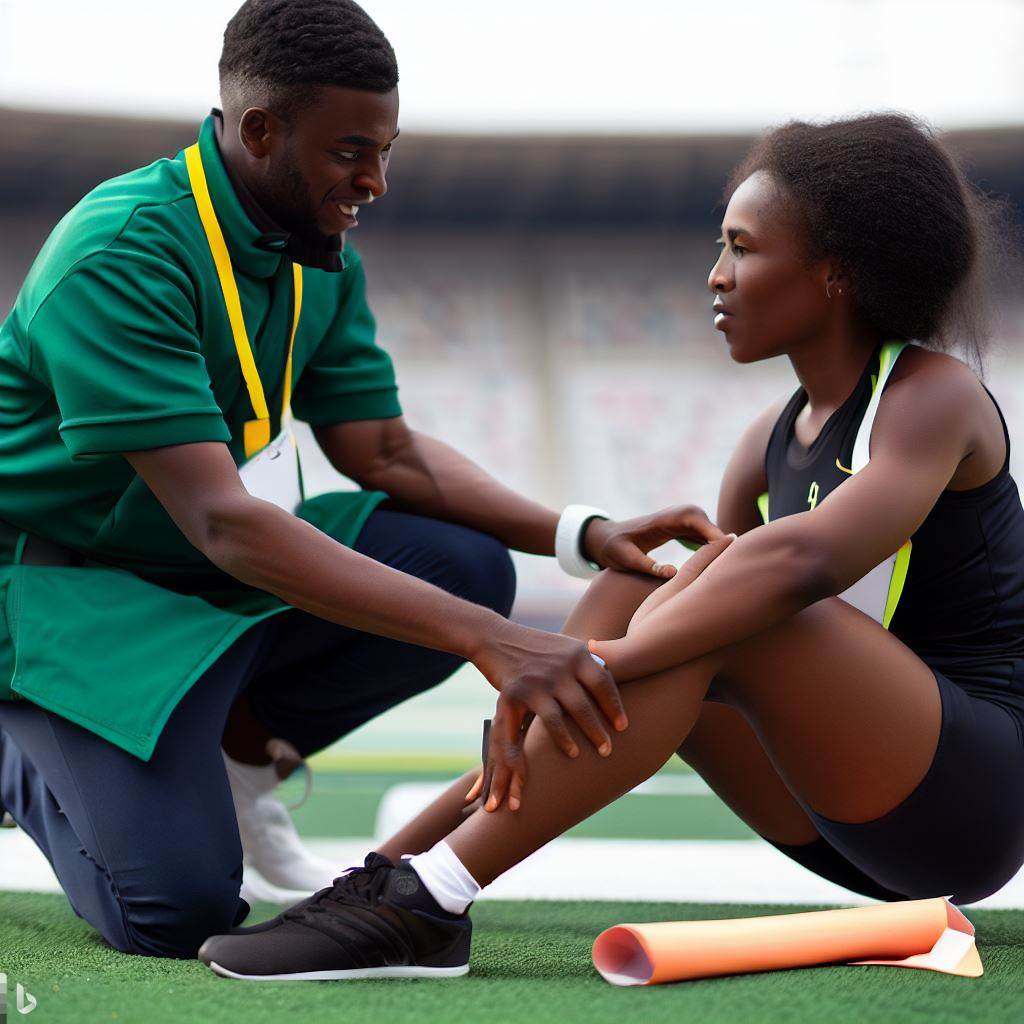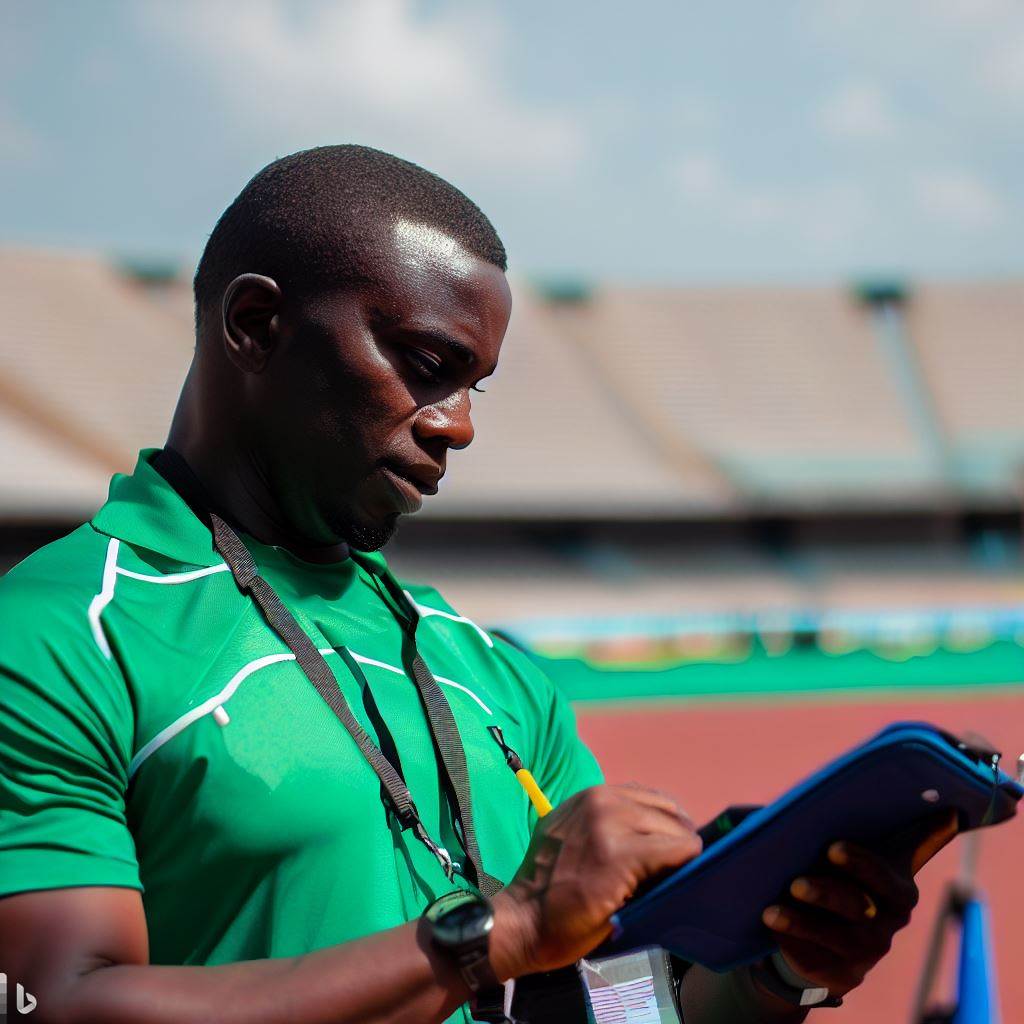Introduction
Importance of Youth and Sports in Nigeria
- Youth and sports are pivotal in Nigeria’s societal fabric, fostering physical health and teamwork.
- Sports provide a platform for character development, instilling values like discipline and perseverance.
- Nigeria’s rich athletic talent pool necessitates nurturing to excel on the global stage.
Significance of Athletic Trainers in the Development of Young Athletes
- Athletic trainers play a critical role in Nigeria sports by preventing injuries, ensuring athletes’ long-term health.
- They tailor fitness regimens, optimizing performance and maximizing athletes’ potential.
- Trainers serve as mentors, guiding young athletes through challenges and fostering a strong work ethic.
- Their expertise enhances Nigeria’s competitiveness, transforming budding talents into international sports stars.
In this section, we delve into the crucial nexus between youth, sports, and the unsung heroes – athletic trainers – shaping Nigeria’s sporting future.
Overview of youth sports in Nigeria
Popular youth sports in Nigeria
- Football
- Basketball
- Athletics
- Volleyball
- Boxing
- Tennis
- Table tennis
Challenges faced by young athletes in the country
- Lack of proper training facilities
- Insufficient funding and sponsorship opportunities
- Poor coaching and development programs
- Limited access to sports equipment and resources
- Inadequate medical support and athletic trainers
- Social and cultural barriers
- Corruption and mismanagement in sports administration
Read: Working Conditions of Athletic Trainers in Nigeria: A Survey
Understanding the role of athletic trainers
Definition and responsibilities of athletic trainers
- Athletic trainers are healthcare professionals who specialize in preventing, diagnosing, and treating injuries related to sports and physical activity.
- They work closely with athletes to develop injury prevention programs and provide immediate care in case of injuries.
- They are responsible for evaluating and assessing injuries, providing first aid, and initiating emergency medical care when required.
- Athletic trainers also play a crucial role in Nigeria sports by helping with rehabilitation process and creating customized exercise and treatment plans for athletes.
- They collaborate with coaches, healthcare providers, and parents to ensure the overall health and safety of athletes.
The importance of athletic trainers in injury prevention and treatment
- Athletic trainers play a vital role in Nigeria sports by preventing injuries by implementing proper warm-up routines, teaching proper techniques, and promoting safe equipment use.
- They educate athletes about the importance of rest, hydration, and proper nutrition for injury prevention.
- They are trained to recognize potential risk factors and make necessary modifications to training programs to minimize the chances of injuries.
- In case of injuries, athletic trainers provide immediate on-site care, including first aid, injury evaluation, and applying appropriate treatment techniques.
- Through their expertise, athletic trainers ensure prompt and effective injury treatment, reducing the recovery time for athletes.
Role in improving performance and overall well-being of young athletes
- Athletic trainers are not only focused on injury prevention and treatment but also play the role on enhancing the performance of young athletes in Nigeria sports.
- They work closely with individuals to improve their strength, flexibility, and overall conditioning.
- They create personalized training programs to address specific weaknesses and help athletes reach their optimal performance levels.
- Athletic trainers provide guidance on proper biomechanics and form to maximize efficiency and reduce the risk of overuse injuries.
- They also prioritize the mental and emotional well-being of young athletes by offering support, counseling, and stress management techniques.
Basically, athletic trainers play a crucial role in the youth sports ecosystem in Nigeria.
They are responsible for injury prevention, immediate on-site care, rehabilitation, and performance enhancement.
Their expertise helps ensure the well-being and safety of young athletes, allowing them to thrive and achieve their full potential in sports.
Read: International Opportunities for Athletic Trainers from Nigeria
The current state of athletic trainers in Nigeria
Without recognition and support, the profession fails to attract individuals who can acquire the necessary training and certification.
This perpetuates the shortage of qualified athletic trainers, creating a vicious cycle.
Recognizing the importance of athletic trainers and addressing these issues is crucial for the growth of sports in Nigeria.
Firstly, there is a need for awareness campaigns that educate various stakeholders about the role of athletic trainers.
Government agencies should be encouraged to include athletic trainers in their sports programs and allocate funds for their training and employment.
Sports organizations need to prioritize the hiring of certified athletic trainers to ensure the safety and well-being of their athletes.
Institutions of higher education can also play a vital role by introducing specialized programs for athletic trainers.
These programs should equip students with the necessary knowledge and practical skills to excel in this field.
Furthermore, partnerships with international organizations and countries with a well-established athletic training profession can provide valuable support and mentorship.
Ultimately, the goal should be to create a sustainable system that recognizes and values the work of athletic trainers in Nigeria.
Through increased recognition, support, and the growth of certified professionals, the quality of sports healthcare can be significantly enhanced.
Athletes will benefit from proper injury prevention, treatment, and rehabilitation, leading to improved performance and longer sporting careers.
Moreover, athletic trainers will gain the respect and acknowledgment they deserve for their critical role within the sports industry.
In essence, the current state of athletic trainers in Nigeria is characterized by a lack of recognition and an insufficient number of certified professionals.
Addressing these issues requires a collaborative effort from various stakeholders to prioritize the importance of this profession and invest in its development.
By doing so, Nigeria can ensure the health, safety, and success of its athletes while elevating the sports industry as a whole.
Read: Trends and Innovations in PE Teaching in Nigeria

The need for increased awareness and support
Athletic trainers play a crucial role in ensuring the safety and well-being of youth involved in sports activities.
However, their importance is often overlooked, leading to a lack of support and resources for these professionals.
Importance of educating parents, coaches, and athletes about the role of athletic trainers
Educating parents, coaches, and athletes about the role of athletic trainers is essential.
Many parents and coaches may not fully understand the range of services athletic trainers provide.
By raising awareness, they can make more informed decisions regarding their children’s involvement in sports.
These healthcare professionals are not only responsible for injury prevention and assessment but also provide rehabilitation and support in the event of an injury.
Therefore, educating parents, coaches, and athletes can help them recognize the value of having athletic trainers as part of their sports programs.
Collaborating with sports organizations and government agencies
It is crucial to gaining better recognition and funding for athletic trainers.
Sports organizations should understand the significance of having qualified professionals dedicated to the well-being of their athletes.
Athletic trainers require appropriate training and resources to effectively perform their duties.
By collaborating with sports organizations, trainers can obtain necessary funding to enhance their skills and provide optimal care to athletes.
Government agencies also play a vital role in supporting athletic trainers.
These agencies should allocate sufficient funds to promote the inclusion of athletic trainers in all youth sports programs.
This not only ensures the safety of young athletes but also contributes to the overall development of sports in Nigeria.
Advocating for the inclusion of athletic trainers in youth sports programs
Many sports programs do not prioritize the presence of athletic trainers, potentially putting young athletes at risk.
It is crucial to advocate for the mandatory inclusion of trainers in all youth sports programs.
Athletic trainers are trained to handle various types of injuries and emergencies effectively.
Their presence can prevent catastrophic incidents and ensure immediate medical attention is given when needed.
By advocating for their inclusion, we can safeguard the well-being of young athletes and create a safer sports environment.
Basically, increased awareness and support are necessary to recognize the role of athletic trainers in Nigerian youth sports.
Educating parents, coaches, and athletes about their responsibilities, collaborating with sports organizations and government agencies, and advocating for their inclusion in sports programs are all vital steps.
By taking these actions, we can ensure the presence of qualified professionals who can effectively address injuries and promote the overall well-being of youth engaged in sports activities.
Read: Benefits of Becoming an Athletic Trainer in Nigeria
Successful examples of athletic training programs in other countries
In order to enhance the effectiveness and efficiency of athletic training in Nigeria, it is essential to examine successful examples from countries with well-established athletic training programs.
By learning from these countries and adapting their best practices to suit the Nigerian context, significant improvements can be made in promoting youth sports and the role of athletic trainers.
Lessons Nigeria can learn from countries with established athletic training systems
1. United States of America
The United States has one of the most advanced athletic training systems in the world. Nigeria can learn from their emphasis on education and certification for athletic trainers.
Implementing standardized certification programs and educational requirements can ensure qualified trainers are available across the country.
2. Australia
Australia’s athletic training program focuses on developing specialized skills and knowledge for different sports.
Nigeria can adopt a similar approach and create specialized training programs for popular sports in the country.
This will ensure trainers have in-depth understanding and expertise in specific sports, leading to better player care and injury prevention.
3. United Kingdom
The United Kingdom’s athletic training system emphasizes interdisciplinary collaborations between medical professionals, coaches, and trainers.
Nigeria can establish similar collaborations to provide holistic care for athletes, combining medical expertise, coaching tactics, and athletic training skills.
Implementing best practices and adapting them to suit the Nigerian context
1. Infrastructure development
Nigeria can learn from countries with successful athletic training programs by investing in sports facilities, including proper training centers and medical facilities.
Adequate infrastructure is essential for providing quality athletic training services.
2. Education and certification
To enhance the credibility and professionalism of athletic trainers, Nigeria needs to implement standardized certification programs and educational requirements.
Additionally, continuous education and professional development should be emphasized to keep trainers updated with the latest practices.
3. Research and innovation
Encouraging research and innovation in athletic training can help Nigeria stay at the forefront of advancements in the field.
Collaboration with universities and research institutions can facilitate the development of evidence-based practices and improve athlete care.
4. Promotion and awareness
Creating awareness about the role of athletic trainers and the importance of youth sports is crucial.
Nigeria should promote the value of athletic trainers through media campaigns, workshops, and educational initiatives to highlight their contribution to athlete health and performance.
Lastly, Nigeria can greatly benefit from studying successful athletic training programs in other countries.
By understanding their best practices and adapting them to suit the Nigerian context, the country can improve the quality of athletic training, provide better care for athletes, and promote the importance of youth sports.
With a strong athletic training system, Nigeria can develop young talents, minimize injuries, and enhance overall athletic performance.
Conclusion
Athletic trainers play a crucial role in youth sports in Nigeria, ensuring the safety and well-being of young athletes.
With their expertise in injury prevention, assessment, and rehabilitation, athletic trainers contribute to the overall development of young athletes.
It is essential for stakeholders, including sports associations, schools, and parents, to recognize and support the importance of athletic trainers.
By providing the necessary resources and support, stakeholders can prioritize the role of athletic trainers in developing young athletes.
Together, we can create a safer and more nurturing environment for youth sports in Nigeria, allowing young athletes to thrive and reach their full potential.
Let’s work together to ensure the well-being and success of our young athletes by supporting and prioritizing athletic trainers.




